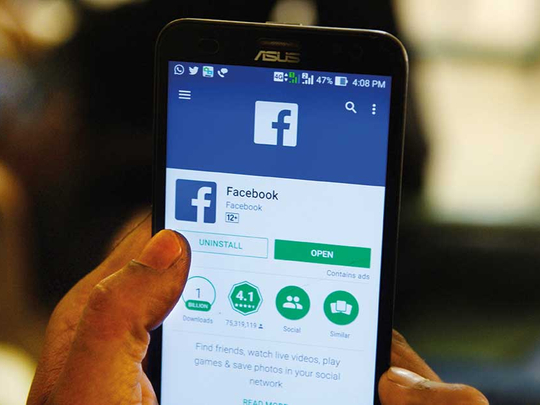
The news that Cambridge Analytica, a political data firm that worked on President Donald Trump’s 2016 campaign, was able to gain access to private data through the social network has sparked an unusually strong reaction among its users.
In the UAE and around the world, the consternation is palpable.
“Honestly, I did consider it however it is a useful tool to stay connected with friends and family. I am a more hesitant user in terms of using any apps within Facebook and I never click the advertisements so the chances of my data being collected by a 3rd party are really slim. Facebook sharing my data is a different story though. I don’t have my phone number and the email address I use is a dummy one anyway,” he said.
He believes the case of Cambridge Analytica was a case of “premeditated deception and should be treated as a criminal offence.”
For Jojy James, an Indian journalist based in Dubai, Facebook was an addiction but a month ago, he deactivated his account.
- Jojy James | Journalist
In Los Angeles, Richard H. Perry, a filmmaker, has wanted to leave Facebook for long. He never felt comfortable knowing that the company had access to much of his personal information. In the months before the 2016 presidential election, he watched the social network become what he called “a garbage platform of ads and weird reposted articles and people that you care about exposing themselves as racists.”
But Facebook was also where Perry promoted his films, where he posted ads seeking help on the set, and where he communicated with colleagues and a “massive number” of his friends and relatives.
Until he heard about Cambridge Analytica.
Perry, 39, has since deleted his profile and plans to switch to Twitter and Instagram for his social media needs.
“It was an easy decision,” he said. “It’s not going to be the end of the world.”
Alexandra Kleeman, a writer in Staten Island, New York, said the Cambridge Analytica scandal led her to remove the Facebook app from her phone. “I’m not going to give them my engagement clicks,” Kleeman, 32, said. But she is keeping the messaging function open for professional purposes and will continue using Instagram.
“The idea that my data could be used for purposes that I expressly don’t want, that freaks me out.”
The furore over Cambridge Analytica, the data mining firm accused of stealing Facebook data, follows a bad year in which Facebook acknowledged helping spread fake news and propaganda from Russian agents. It also comes less than three months after CEO Mark Zuckerberg told the world that he would devote the year to fixing Facebook. Instead, things seem to be getting worse.
Yet leaving Facebook, like ending a long marriage, isn’t remotely simple and not surprisingly, Facebook does not make it easy to leave. Starting with the little things.
To permanently delete your account, you need to make a request to the company. The process can take several days, and if you log in during this time, your request will be cancelled. It can take up to 90 days to delete everything.
There’s a less permanent way to leave, deactivation, which hides your profile from everyone but lets you return if you change your mind.
Lili Orozco, a 28-year-old office manager for her family’s heating and cooling company in Watkinsville, Georgia, deleted her account in December. She was upset that every new app she downloaded would ask for her Facebook contacts.
And while she liked staying in touch with people, she was irritated by the conspiracy stories her high school friends would share.
“Falsehoods spread faster on Facebook than the truth does,” she said. She now gets her news from Twitter and shares pictures with friends through Instagram.
For other users looking to leave, it can feel as if there are no real alternatives. Twitter? Too flighty, too public. Instagram? Whoops, owned by Facebook. Snapchat? Please, unless you’re under 25 — in which case you’re probably not on Facebook to begin with.
Facebook connects 2.2 billion users and a host of communities that have sprung up on its network. No other company can match the breadth or depth of these connections — thanks in part to Facebook’s proclivity for squashing or swallowing up its competition.
Protect yourself
Cambridge Analytica, in association with Aleksander Kogan, a Cambridge University lecturer and his firm Global Science Research created an app called thisisyourdigitallife. This app was used to conduct a personality quiz among over 200,000 paid volunteers who were told that any and all data collected would be used for academic research purposes. The app also showed Facebook friends of all of these volunteers.
This gave Cambridge Analytica access to behavior trends of over 50 million American Facebook users. A system was created to track likes, shares and reactions of these users on Facebook to create character profiles which included political views, childhood trauma or incidents, sexual orientation, interests and more – none of which are explicit data points on Facebook. The data mining was solely based on online behavior.
One single email id for social media, banking, applications, correspondence and everything else? You’re in the most vulnerable group of online users because now anyone on Facebook, Instagram, YouTube or other app has access to your primary email id and the data you have related to it.
Any photo you post online is Facebook’s ‘property’, and visible to the right kind of hackers even if you go back and delete it. Never post personal pictures and pictures of identity documents.
You don’t need to put in your year of birth to give Facebook your age. If you use crowd sourced applications or links on Facebook for personality quizzes, you have already given them your age range, your interests and your most important friend groups.
Every app now has three sign-up or login options – Facebook, Google or other email. The minute you sign in with Facebook for easy access, everything you do on the app is now open data. This includes online shopping, booking taxi rides or even movies, and health and fitness applications.
If you save your credit/debit card details for ease of use on an app that you’ve cross-linked to Facebook, you’re vulnerable to financial fraud.
Love geo-tagging yourself? This could put you at risk of physical threats or robberies. In 2016, some American burglars admitted to police about using Facebook to make sure that the victims weren’t home and that they had valuables.












